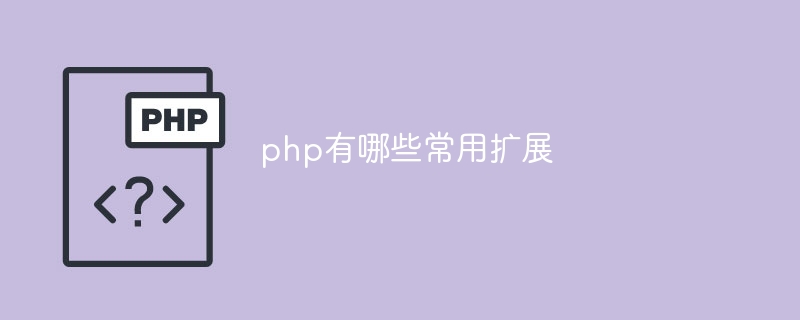
Commonly used PHP extensions include: 1. GD, which is a PHP image processing extension; 2. MySQLi, which is an extension for PHP to interact with the MySQL database; 3. PDO, which is a database abstraction layer extension for PHP; 4. Memcached , is a high-performance distributed memory object cache system; 5. Redis, is a high-performance key-value storage system; 6. Imagick, is a PHP and ImageMagick image processing tool; 7. SOAP; 8. XML; 9. OpenSSL ; 10. Zip.

The operating environment of this tutorial: windows10 system, php8.1.3 version, DELL G3 computer.
PHP is an open source scripting language that is widely used in the field of web development. It is easy to learn, cross-platform, flexible, etc., and supports rich extension functions, allowing developers to choose and use different extensions according to their own needs. This article will introduce some commonly used PHP extensions to help readers better understand and use PHP.
1. GD: The GD extension is a PHP image processing extension that provides a powerful set of functions for creating, manipulating, and processing images. Using the GD extension, we can generate verification codes, crop pictures, zoom pictures, add watermarks and other image processing operations.
2. MySQLi: The MySQLi extension is an extension for PHP to interact with the MySQL database. It provides a set of object-oriented APIs that make it easier to perform database connection, query, insert, update and delete operations.
3. PDO: PDO (PHP Data Object) is a database abstraction layer extension of PHP that supports a variety of database systems, such as MySQL, SQLite, Oracle, etc. It provides a unified API that encapsulates the operations of different databases into a unified form, making it easier for developers to switch between different databases.
4. Memcached: Memcached is a high-performance distributed memory object caching system that can help Internet applications improve performance. PHP's Memcached extension provides an API for interacting with the Memcached server, which can reduce database access by caching commonly used data, thereby improving system performance.
5. Redis: Redis is a high-performance key-value storage system that supports a variety of data structures, such as strings, lists, hashes, sets, etc. The Redis extension of PHP provides an API for interacting with the Redis server, which can easily store, read and operate data.
6. Imagick: The Imagick extension is an extension for PHP to interact with the ImageMagick image processing toolset. It provides powerful image processing functions, including size change, filter application, color adjustment, etc. Using the Imagick extension, we can easily perform various advanced image processing operations.
7. SOAP: The SOAP extension is a web service extension for PHP that enables data exchange with other applications. Using SOAP extensions, we can easily create Web services, support HTTP communication protocol, and data transmission in XML format.
8. XML: XML extension is PHP's XML parsing extension, which supports parsing and operating XML files. It provides a set of simple and easy-to-use APIs that can easily read data in XML files and generate XML files.
9. OpenSSL: The OpenSSL extension is an encryption and decryption extension for PHP that supports data encryption and decryption using the SSL/TLS protocol. It provides a set of APIs that can easily encrypt, decrypt, generate and verify digital certificates for data.
10. Zip: The Zip extension is a compression and decompression extension for PHP that can easily compress and decompress files and folders. It provides a set of APIs that can create, read and process ZIP files.
The above is the detailed content of What are the commonly used extensions for php?. For more information, please follow other related articles on the PHP Chinese website!